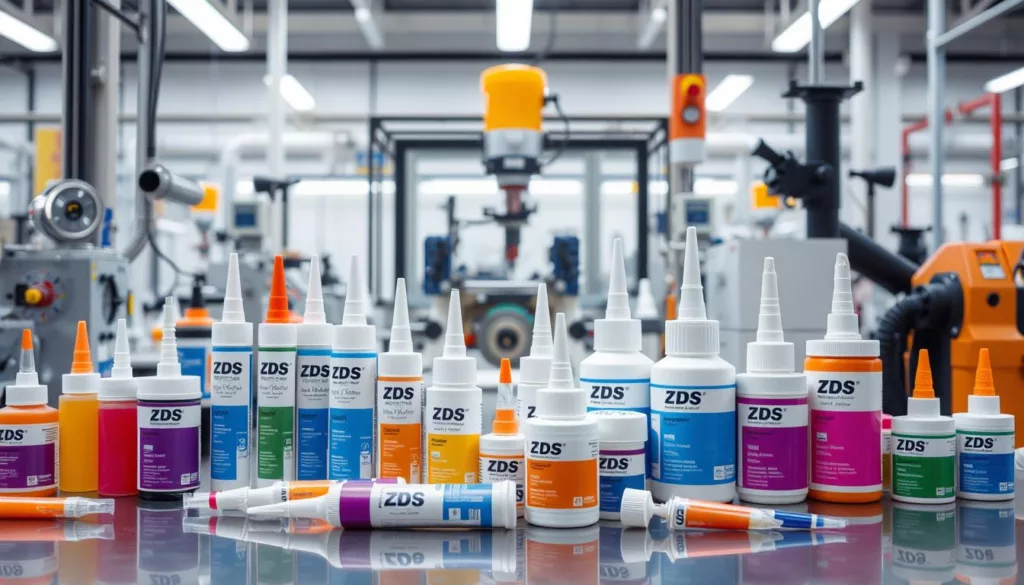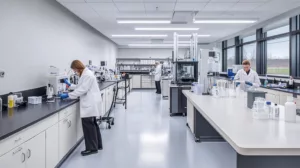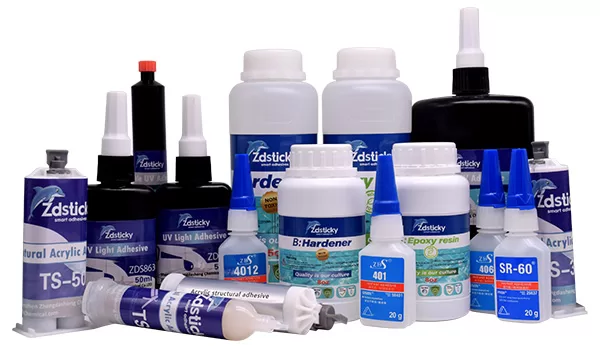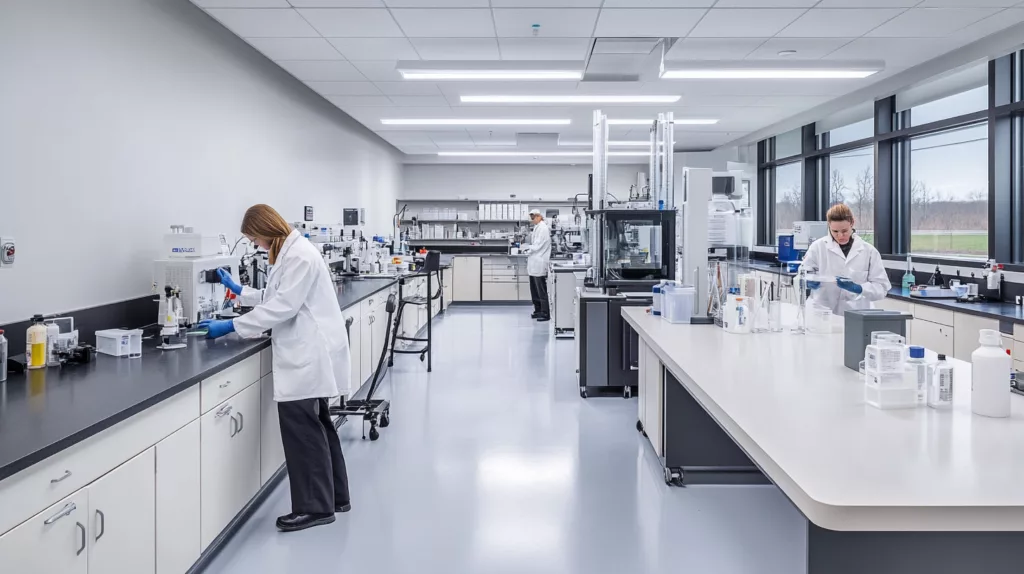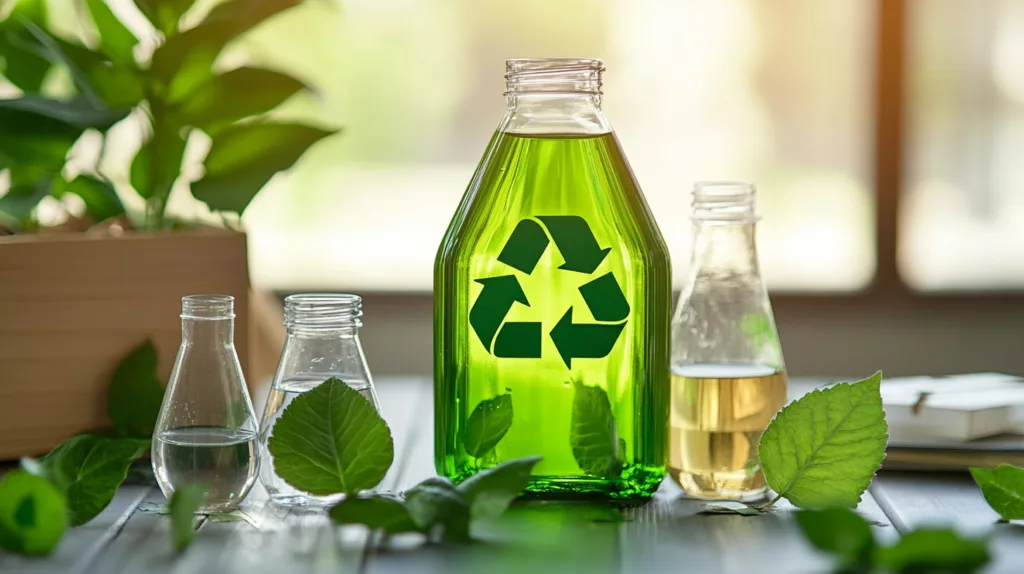In the fast-paced world of production, customizable adhesive solutions for manufacturing industries are key. These adhesives are made to fit the needs of different sectors. They boost efficiency and productivity at every stage of making products.
As the demand for custom options grows, industrial adhesive solutions have become vital. They help manufacturers improve their workflows. This is important for working with various materials and complex tasks.
The right adhesive can greatly affect product quality and how well things work. We see how important these solutions are in the manufacturing world. As industries change, so does the need for adhesives that meet specific needs and support new ways of making things.
For more on adhesive technologies, check out our resources on adhesive solutions for the manufacturing sector.
Key Takeaways
- Customizable adhesives enhance manufacturing efficiency.
- Tailored adhesive solutions are essential for diverse industry applications.
- Adhesive choice impacts overall product quality.
- Innovation drives the need for unique adhesive solutions.
- Understanding material compatibility is key for adhesive selection.
Understanding Customizable Adhesive Solutions
Customizable adhesives offer a flexible way to meet the needs of the manufacturing world. They can be adjusted in many ways, like their formula, thickness, and how well they stick. This lets manufacturers create solutions that fit their exact needs, making production better.
Definition of Customizable Adhesives
Custom adhesives are made to fit different factory needs. They can change to work with many materials, uses, and settings. With the right mix, these adhesives stick well and work as needed, fitting special requirements.
Benefits for the Manufacturing Sector
Using custom adhesives brings many benefits for making things better:
- Increased adhesion strength: Better sticking means products last longer.
- Improved product longevity: Special formulas help products last longer by reducing wear.
- Reduced production time: Faster application means making things quicker.
Knowing these benefits helps manufacturers pick the right adhesives. This can really improve how fast and well they make things.
Key Applications in Manufacturing
Customizable adhesive solutions are key in many manufacturing areas. They fit the unique needs of each field. Let’s look at some main uses where they boost performance and efficiency.
Automotive Industry
In cars, special adhesives are needed for parts that face a lot of stress. These adhesives keep the car strong even in tough conditions. They help with:
- Sticking metal, glass, and plastics together for a strong car body.
- Attaching inside parts for looks and function.
- Reducing noise and managing heat.
Electronics Assembly
For electronics, light and conductive adhesives are best. They make sure electronics work well and are efficient. The benefits are:
- Gluing sensitive parts without adding weight.
- Making electrical connections needed for devices to work.
- Keeping electronics safe from moisture and temperature changes.
Packaging Solutions
In packaging, strong adhesives keep products safe during shipping. Special adhesives make packaging better and safer. They also help with:
- Stopping leaks or contamination.
- Working well with different materials like plastics and cardboard.
- Being good for the environment.
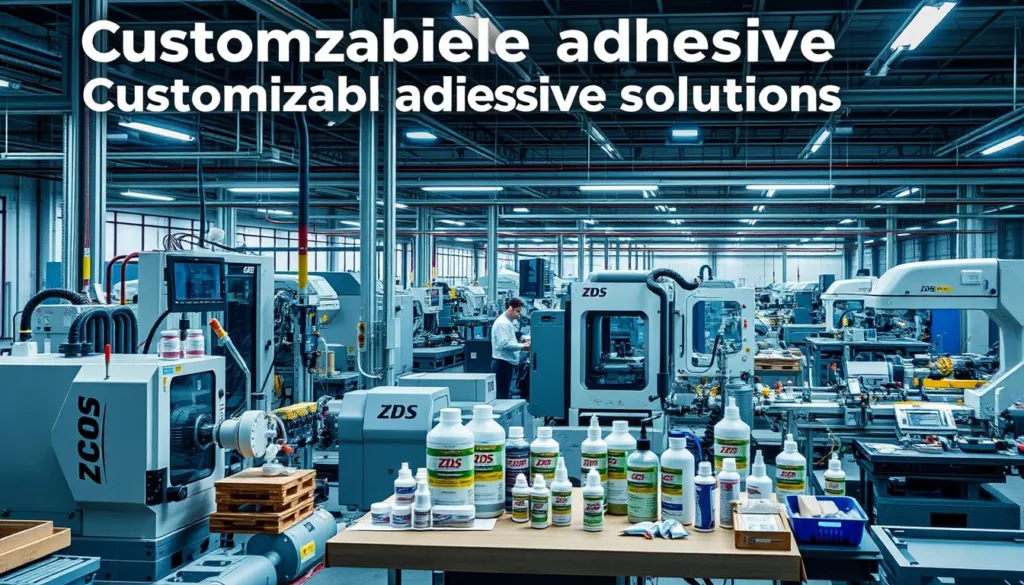
| Application Area | Key Features | Benefits |
|---|---|---|
| Automotive Industry | High-stress bonding, durability | Enhanced vehicle integrity, reduced noise |
| Electronics Assembly | Lightweight, conductive | Reliable performance, reduced component weight |
| Packaging Solutions | Strong seals, environmental safety | Product safety during transport, reduced waste |
Types of Customizable Adhesives
In the world of manufacturing, different types of adhesives meet various needs. Each type has its own strengths, fitting different manufacturing needs.
Water-Based Adhesives
Water-based adhesives are good for the environment. They use water as the main solvent. These adhesives are great for materials like paper, wood, and fabric. They are strong and versatile, making them a good choice for many applications.
Solvent-Based Adhesives
Solvent-based adhesives use organic solvents to bond materials. They work well with heavy materials, making them popular in the automotive and construction industries. But, they need careful handling because of the solvents. They are strong and durable, perfect for tough applications.
Hot Melt Adhesives
Hot melt adhesives dry fast, making them perfect for quick production lines. They melt when heated and solidify when cooled. This makes them versatile for many uses, from packaging to electronics. They are great for those who need speed without losing quality.
Thermosetting Adhesives
Thermosetting adhesives are great for high-temperature places like aerospace and automotive. Once set, they can handle extreme heat. They ensure strong bonds even in tough conditions. Their heat resistance is key for safety and performance in critical areas.
There are many adhesive options for manufacturing, each with its own role. Choosing the right one is key for success. To learn more about specialized adhesives, like those for the petroleum industry, check out this resource.
| Type of Adhesive | Key Characteristics | Common Applications |
|---|---|---|
| Water-Based Adhesives | Environmentally friendly, low VOC | Paper, wood, fabric bonding |
| Solvent-Based Adhesives | Strong bonding, suitable for heavy materials | Automotive, construction |
| Hot Melt Adhesives | Quick setting, versatile | Packaging, electronics |
| Thermosetting Adhesives | High thermal resistance | Aerospace, automotive applications |
Factors to Consider When Choosing Adhesives
Choosing the right adhesive is key for many applications. It’s important to think about how adhesives can be customized for manufacturers. Each detail is important for strong and lasting bonds.
Material Compatibility
Every material is different, affecting how you pick an adhesive. Knowing what each material needs is critical for good bonding. If materials don’t work well together, it can ruin the product’s quality. It’s important to check how adhesives work with different surfaces, including:
- Type of material (plastic, metal, wood, etc.)
- Surface finish and texture
- Moisture and chemical exposure
Curing Time and Process
The time it takes for an adhesive to bond is a big deal. Some adhesives dry fast, which can speed up production. Important things to think about include:
- Instant adhesives for quick bond strength
- Heat-cured options for enhanced performance
- Room-temperature curing alternatives for flexibility
Temperature Resistance
Adhesives often face extreme temperatures. Finding ones that can handle these conditions is essential. Important factors include:
- Operating temperature range of the adhesive
- Thermal cycling effects on bond performance
- Long-term efficacy under sustained heat exposure
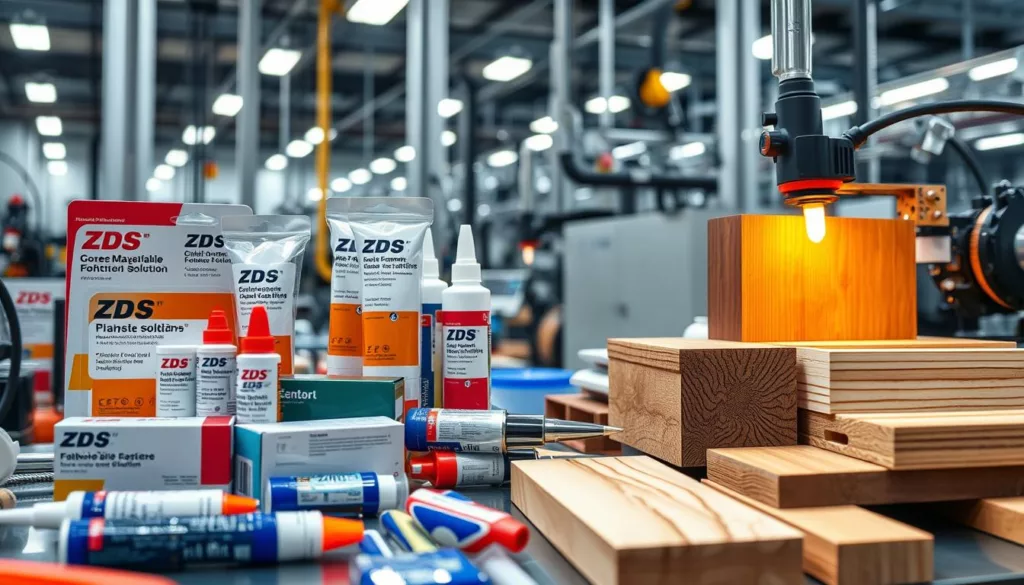
Industry-Specific Adhesive Requirements
Every industry has its own set of challenges when it comes to adhesives. It’s important to know these specific needs to choose the right adhesive. The aerospace, medical, and construction fields all need special solutions. These must ensure top performance, safety, and meet strict standards.
Aerospace Adhesives
Aerospace needs adhesives that are very specific. They must have:
- Lightweight formulas to save fuel.
- High strength to handle extreme conditions.
- Resistance to environmental stressors like temperature and humidity changes.
Medical Device Manufacturing
In medical devices, adhesives must follow strict rules. They need to have:
- Biocompatibility for patient safety.
- Durability through sterilization without losing strength.
- Non-toxicity to prevent harm during use.
Construction Adhesives
Construction adhesives must be very strong. They should have:
- Load-bearing capabilities for building strength.
- Moisture resistance to last longer.
- Long-lasting adhesion in different weather conditions.
| Industry | Key Requirements |
|---|---|
| Aerospace | Lightweight, high strength, environmental resistance |
| Medical | Biocompatible, sterilizable, non-toxic |
| Construction | Load-bearing, moisture resistant, durable |
The Benefits of Customization
Customizable adhesives offer many benefits for the manufacturing industry. They help meet specific needs, improving efficiency and product quality.
Tailored Performance Features
Custom adhesives let you choose the right properties for your needs. You can adjust things like bonding strength and cure time. This makes your products perform better.
Manufacturers can pick the best adhesive based on:
- Environmental conditions
- Substrate materials
- Application methods
Cost-Effectiveness
Customization can save money for manufacturers. It helps by reducing waste and speeding up production. This means lower costs overall.
- Minimized waste during application
- Increased production speed
- Reduced need for additional processing
Enhanced Product Performance
Custom adhesives lead to better products. They make your products stronger and last longer. This raises the quality of your products.
- Stronger end products
- Improved longevity and durability
- Higher overall quality standards
In summary, customization in adhesives helps manufacturers meet their needs. It improves performance and efficiency.
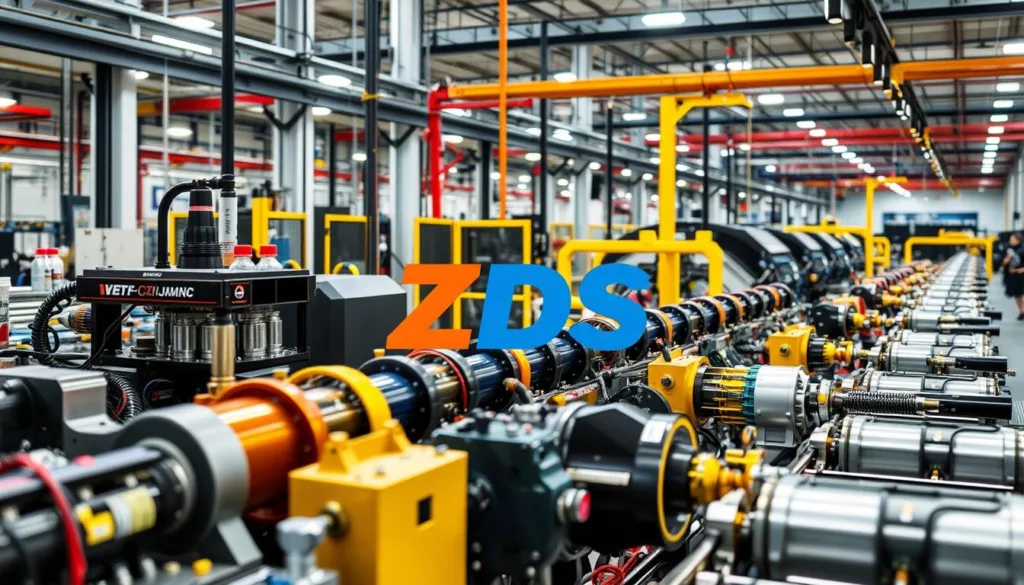
| Benefit | Description |
|---|---|
| Tailored Performance Features | Specific attributes that match application requirements. |
| Cost-Effectiveness | Reduced manufacturing costs through efficient adhesive use. |
| Enhanced Product Performance | Stronger and longer-lasting products through optimized adhesives. |
Innovations in Adhesive Technologies
Technology keeps getting better, and so do adhesives. New advancements aim to be more efficient and green. These changes show how bespoke adhesives can improve production facilities.
Sustainable Adhesive Solutions
More companies want eco-friendly options. They’re using bio-based materials in adhesives to cut down on harm to the environment. This move meets legal standards and matches what consumers want.
Smart Adhesives
Smart adhesives are a big step forward in making things. They can change based on things like temperature and moisture. They’re used for simple and complex tasks, making products better and more reliable.
Development of High-Performance Adhesives
New adhesives are being made to handle tough jobs. They can stand up to extreme temperatures and bond better. As bonding tech gets more complex, the need for special adhesives grows to stay ahead in the market.
| Type of Innovation | Description | Benefits |
|---|---|---|
| Sustainable Adhesive Solutions | Use of bio-based materials in adhesives. | Reduces environmental impact, meets consumer demand. |
| Smart Adhesives | Respond to environmental conditions for optimal performance. | Adapts to various applications, ensuring reliability. |
| High-Performance Adhesives | Formulations designed for extreme conditions. | Enhances bonding capabilities, meets specific industrial needs. |
Challenges in Using Adhesives in Manufacturing
Manufacturers often face several challenges when using adhesives. It’s important to understand these challenges. This ensures adhesives work well and last long.
Application Methods
The right application method is key to good adhesion. Techniques like spray, nozzle, or roller coating can affect results. Consider:
- Precision of application
- Consistency in adhesive layer thickness
- Speed of the application process
Environmental Factors
Environmental conditions are important for adhesives. Humidity, temperature changes, and chemicals can weaken adhesion. Keeping an eye on these factors is vital.
Regulatory Compliance
Following industry rules is essential for safety and compliance. Adhesives must meet all standards. It’s important to know about:
- Safety guidelines for adhesive usage
- Environmental regulations regarding chemical emissions
- Performance standards for specific applications
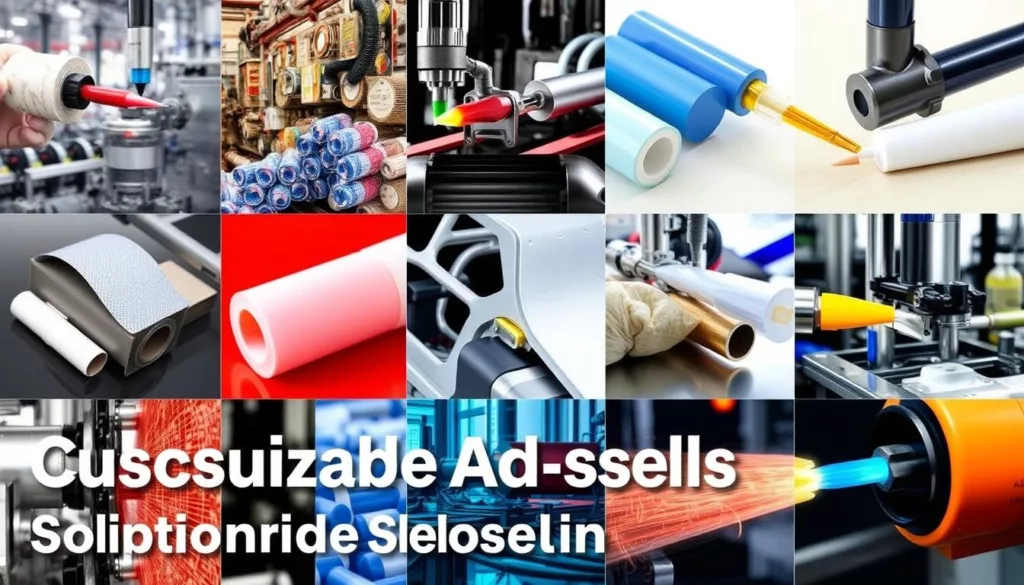
| Challenge | Impact on Adhesive Performance | Solution Strategies |
|---|---|---|
| Application Methods | Inconsistent adhesion strength | Choose precise application techniques |
| Environmental Factors | Reduced adhesive effectiveness | Control temperature and humidity |
| Regulatory Compliance | Risk of legal issues | Stay updated on regulations |
The Role of Adhesives in Sustainable Manufacturing
In today’s manufacturing world, adhesives are key to being green. More companies want to cut down on their environmental harm. They’re looking for adhesives that are good for the planet and work well.
Eco-Friendly Options
Now, makers are searching for green adhesives. These are made with:
- Biodegradable parts
- Less harmful chemicals
- Materials that are good for the earth
By choosing special adhesives, businesses can make their work better and greener.
Reducing Waste
Good adhesives help cut down on waste. They make products last longer and need less fixing. This makes making things more efficient and less wasteful.
Choosing the right adhesives helps companies work better and be kinder to the planet.
| Eco-Friendly Adhesive Feature | Benefit | Example |
|---|---|---|
| Low VOC Content | Improves air quality | Water-based adhesives |
| Biodegradable Material | Reduces landfill waste | Plant-based adhesives |
| Recycled Ingredients | Conserves resources | Synthetic adhesives made from recycled plastics |
Evaluating Adhesive Suppliers
Finding the right adhesive supplier is key for manufacturers aiming for top quality and consistency. The choice depends on several factors. These include the quality of the adhesive and the supplier’s ability to meet specific needs, like adhesive customization for manufacturers.
Key Selection Criteria
When looking at adhesive suppliers, focus on these key points:
- Product quality and performance
- How well they communicate and respond
- Can they tailor adhesives to fit your needs?
- Do they have the technical know-how for adhesive use?
Importance of Technical Support
Good technical support is a big deal. Suppliers with expertise offer valuable advice on choosing the right adhesive. This advice helps manufacturers use the right products, lowering risks and boosting efficiency.
Supplier Certifications
Certifications show a supplier’s commitment to quality and safety. Suppliers with recognized certifications follow industry standards. This is very important for adhesive customization for manufacturers with special needs.
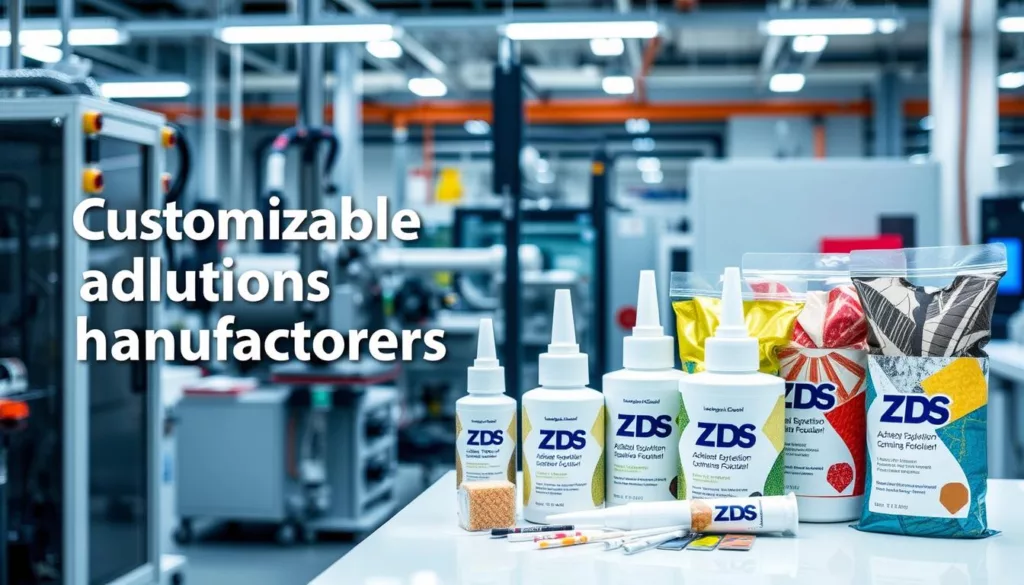
| Criteria | Description |
|---|---|
| Product Quality | Ensures reliability and performance of adhesive solutions |
| Technical Support | Provides insights for selection and application, aiding manufacturing efficiency |
| Supplier Certifications | Indicates compliance with industry standards and safety requirements |
| Customization Capability | Ability to tailor adhesive solutions to meet specific needs |
By considering these factors, manufacturers can find the best adhesive suppliers. We know how important good supplier relationships are for success in manufacturing. These steps help ensure quality and drive innovation in adhesive customization for manufacturers.
Case Studies of Successful Adhesive Applications
Looking at real-world uses of customizable adhesives shows their big impact on making things better and faster. We’ll share two great examples from the car and electronics worlds. These stories show how adhesives can really make a difference.
Automotive Industry Success Story
A big car maker was struggling with slow assembly lines. They found a solution in custom adhesives made just for them. These adhesives helped a lot.
- Assembly time went down by 20%.
- Joint strength improved under stress.
- They saved money by fixing fewer mistakes.
Electronics Manufacturing Case Study
An electronics company wanted to make their products better and faster. They used a special adhesive for their parts. It worked wonders.
- Production speed went up by 30%.
- Products lasted longer against heat and moisture.
- There were fewer mistakes in the final product.
These examples show how special adhesives are key to better manufacturing. They help make products better and faster. As things change, being able to make adhesives for specific needs will keep driving success.
Future Trends in Customizable Adhesives
The world of customizable adhesives is about to see big changes. These changes come from new technologies and shifting industry needs. Adhesive makers are working hard to make their products better and more versatile.
They want these adhesives to work well in many different areas of manufacturing. They’re focusing on improving how well they stick, how fast they dry, and how they hold up in different environments. This is key for keeping industrial adhesives strong and reliable.
Advances in Adhesive Development
New ideas in making adhesives are leading to better and greener products. Companies are making adhesives that are good for the planet without losing their effectiveness. They’re also adding special materials that can react to their surroundings.
This makes the adhesives more useful in various industries. It’s a big step towards making products that are both effective and environmentally friendly.
Integration with Automation Technologies
At the same time, adhesives are being used with new automation technologies. This is part of the Industry 4.0 movement. It means adhesives are applied more precisely, quickly, and consistently.
This makes production more efficient and cuts down on waste and costs. It helps create a smoother, more modern production process. As we move forward, we’re ready to adapt and keep up with these advancements.
FAQ
What are customizable adhesive solutions for manufacturing industries?
Customizable adhesive solutions are made to fit the needs of different manufacturing areas. They can be changed in how they stick, their thickness, and how well they bond. This helps make production faster and more efficient.
What benefits do customized adhesives provide for factories?
Custom adhesives help factories in many ways. They make things stick better, last longer, and get made faster. Choosing the right adhesive can really improve how a factory works.
What are some key applications of manufacturing adhesive solutions?
Adhesive solutions are used in many ways. In cars, they help hold parts together under stress. In electronics, they make things lighter and conductive. And in packaging, they seal products safely for transport.
What types of customizable adhesives are commonly used in manufacturing?
There are several types of adhesives used in making things. Water-based, solvent-based, hot melt, and thermosetting adhesives each have their own uses. They depend on what the product needs.
What factors should manufacturers consider when choosing adhesives?
When picking adhesives, think about what they stick to, how long they take to dry, and how they handle heat. This makes sure the adhesive works well in the factory’s environment and for its specific needs.
What are the unique adhesive requirements for the aerospace industry?
Aerospace adhesives need to be very strong and light. They also have to withstand harsh weather conditions. This is to keep aircraft safe and working well.
How do customizable adhesive solutions contribute to sustainable manufacturing?
Custom adhesives help make manufacturing greener. They offer options that are better for the environment and reduce waste. This makes products last longer and is better for the planet.
What should manufacturers look for when evaluating adhesive suppliers?
Look for suppliers that offer high-quality products, good support, and are certified. This ensures you get reliable adhesives that meet your needs.
How do innovations in adhesive technologies impact the manufacturing sector?
New adhesive technologies improve how things are made. They make processes more efficient, reliable, and green. This helps manufacturers tackle new challenges and stay competitive.
What are some challenges manufacturers face when using adhesive solutions?
Using adhesives can be tricky. It’s hard to apply them right, and weather can affect how well they stick. Plus, they must meet safety and performance standards.
Can you provide examples of successful adhesive applications in manufacturing?
Yes, there are many examples. In cars, custom adhesives make assembly faster. In electronics, they improve reliability and speed up production.


